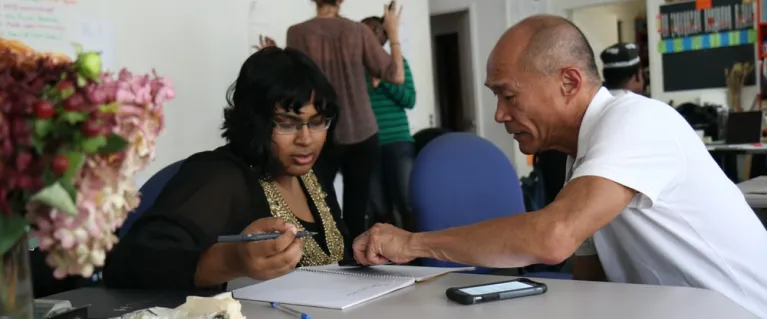
Advice in Community Settings grant programme
Access to good quality, free and independent advice is a vital part of supporting people to escape or prevent financial hardship.
The Mayor of London is committed to helping more Londoners access the advice and support they need.
Between 2021 and 2025, we've funded 10 local advice partnerships through the Advice in Community Settings grant programme.
About the programme
Londoners deserve a trusted, local place to go when they need advice on issues like welfare benefits, debt and housing.
The Advice in Community Settings programme helped more Londoners access advice by building and strengthening partnerships between advice services and trusted community settings, such as schools, food banks and refugee centres.
Evaluation and key findings
Published in November 2025, Mime and Wavehill's evaluation of the programme found that:
- over three years, the programme directly supported 10,914 clients, positively impacting an additional 9,686 household members.
- the programme achieved significant outcomes, including over £8 million in financial gains for clients, averaging £3,600 per successful case, and contributed to long-term benefits such as improved financial stability and mental health.
- the programme strengthened partnership networks to deliver community-based advice and support, fostering new connections and enhancing collaboration to provide holistic services for clients.
Partnerships
The Advice in Community Settings programme funded the following partnerships across London. The lead partners participating in the programme are:
-
Citizens Advice Barking and Dagenham, leading a partnership between the local authority, borough voluntary and community sector (VCS) network and social sector network, and food bank network to address fragmentation in the advice sector locally.
-
Community Links, leading a partnership between five advice providers (some general, some specialist) with support from Newham Council, delivering in food banks, community centres and schools. The partnership focuses on residents in low-paid and insecure work, and the refugee and migrant population.
-
Ealing Mencap, leading a partnership of advice service seeking to connect digitally-excluded residents, residents with learning disabilities or English as a second or other language with training to access online social welfare platforms, entitlements and support services.
-
Rooted Finance, leading a pan-London partnership with Money A&E which embeds welfare and debt advice and financial education in different locations supporting Londoners from a range of Black, Asian and ethnic minority backgrounds.
-
H 4 All, a partnership of health and wellbeing charities, is managing a new partnership between local Citizens Advice, local charities and Deaf and Disabled People’s organisations to deliver advice in food banks and Special Educational Needs schools.
-
Indoamerican Refugee and Migrant Association (IRMO), a partnership between three community anchor institutions in south London has expanded to deliver advice in new locations. The partnership focuses on lone parents, Latin American communities, Spanish- and Portuguese-speaking communities and over-50s.
-
Little Village, a pan-London baby bank service, leading a partnership with the Money and Pensions Service and other advice providers to deliver triage, signposting and advice to low-income families with children under five.
-
Peabody Community Foundation, leading a hyperlocal partnership linking existing social prescribing infrastructure with up to eight schools in the Moorings in Thamesmead, Greenwich.
-
Salusbury World Refugee Centre, leading a Brent-based partnership to expand to include three ages 0 to 18 family and children's centres. The partnership focuses on Londoners who are refugees, migrants or seeking asylum.
-
Citizens Advice Waltham Forest, leading a partnership with fuel poverty, youth and food charities and children and family settings to offer training to frontline staff in community settings.
Case study: Sara's story
Sara* had an accident at work seven years ago. This left her with ongoing health issues affecting her hands, which prevents her from working. Prompted by her local job centre, she applied for a Personal Independence Payment, but her application was unsuccessful three times. As a result, Sara found herself in financial hardship and struggled to pay her bills and to afford food.
Sara visited a food bank, where she met an advice worker who took on her case. The advice worker explained that he could help her with her application for a Personal Independence Payment, and improve her housing situation by helping her apply for council housing. Her advice workers’ openness made her feel comfortable, and together they were able to successfully apply for a Personal Independence Payment and get her on a waiting list for council housing.
I felt comfortable talking to him, I didn’t feel stressed and he understood what I was saying and what I wanted.
Sara can now cover her utility bills and food expenses consistently. Her housing situation is not yet fully resolved, but she is on the waiting list for council housing.
I am much better because I am not worrying. I see a light and somebody cared about my situation.
*Names have been changed.
Need a document on this page in an accessible format?
If you use assistive technology (such as a screen reader) and need a version of a PDF or other document on this page in a more accessible format, please get in touch via our online form and tell us which format you need.
It will also help us if you tell us which assistive technology you use. We’ll consider your request and get back to you in 5 working days.